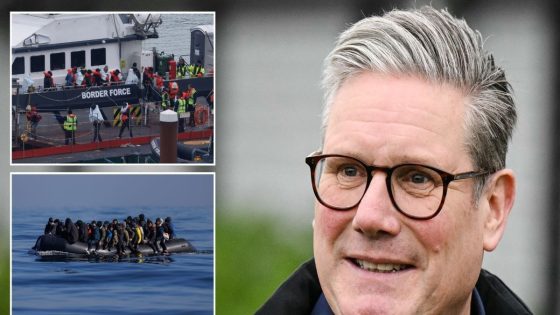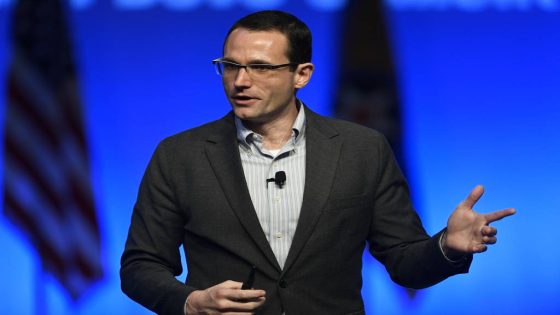As Sir Keir Starmer travelled to the Kent town of Deal to tell us what a Labour government would do to stop the boats, futher along the coast, Border Force vessels were transferring hundreds more Channel migrants to Dover harbour.
Those latest arrivals provided a graphic illustration of the urgent need to tackle an organised criminal trade which has already seen more than 9,000 migrants arrive in UK waters so far this year.
A key plank of the Labour small boats plan is the creation of a new Border Security Command to centralise law enforcement efforts, bringing together Border Force, the National Crime Agency, the domestic intelligence service and police forces.
But in truth, many of these agencies are already working closely under the Small Boats Operational Command, launched by Rishi Sunak in December 2022.
That command structure brought together civilian organisations, the military and the National Crime Agency under a single command, tasked with going after and dismantling the people smuggling gangs.
An additional £75 million for this new command is certainly welcome, but a bit of extra funding, a few more officers and a rebrand is unlikely to make the huge impact on the crime groups Sir Keir is hoping for.
Extra powers to seize criminal assets and closer cooperation with European law enforcement agencies will help. But the criminal gangs have had years to get organised.
They will not easily be disrupted and dismantled. They have sophisticated and robust supply chains in operation.
From the back street factories in China making the small boats to order, to the cross border smugglers moving those parts into Europe and up to northern France, the supplies are well established.
And this is a huge business for these organised crime groups.
With the price of a seat on a boat at around £3,000, the gangs have already achieved a turnover this year of £270 million, and counting.
The closest comparison is the international trade in illicit drugs.
Law enforcement around the world has its successes. Seizures of hundreds of millions of pounds worth of cocaine and heroin headed to Western nations are common place.
But regular drugs busts are only ever a drop in the ocean in what is a highly profitable and well established trade.
While not on quite the same scale, people smuggling operations across the globe are still vast.
With profits in the cross-Channel trade alone measuring in the billions in a busy year, the old familiar game of whack-a-mole is at play.
Take one group of criminals out, their place will soon be taken by another gang popping up and .picking up where they left off.
The Rwanda plan is one area of policy that does reveal a marked difference between Labour and the Conservatives.
For the Tories, the concept of a third country to send asylum seekers to is seen as a key deterrent that they hope will break the business model of the people smugglers.
But Sir Keir Starmer is perfectly clear, a Labour government will scrap any such policy.
However, in doing that, it throws up some fundamental issues for Labour’s stop the boat plans that they haven’t yet fully explained.
A Labour government would employ hundreds of additional case workers to more quickly process asylum claims and end what they say is the unacceptable practice of paying £8 million every day to house tens of thousands of asylum seekers in hotels.
They would be dealt with, we’re told, in a fraction of the time and those with no valid asylum claim would be removed from the UK.
But just take a look at the demographic breakdown of those arriving by small boat and you’ll soon see the issue.
The vast majority are from Afghanistan, Iran, Syria, Iraq and many other nations who have dysfunctional governments at best. Countries no court would ever allow the UK government to return asylum seekers to.
So in the absence of a third nation like Rwanda to send these people to, Labour’s plan falls short.
For six years, the Conservative government has tried and failed to properly grip the growing small boats crisis, not for the lack trying.
Should Sir Keir Starmer win the keys to Downing Street, he’s likely to find that stopping the boats is fiendishly difficult.
Source Agencies



